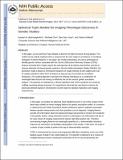Spherical Topic Models for Imaging Phenotype Discovery in Genetic Studies
Author(s)
Cho, Michael; Jose, Raul San; Golland, Polina; Batmanghelich, Nematollah Kayhan
DownloadGolland_Spherical topic.pdf (763.9Kb)
OPEN_ACCESS_POLICY
Open Access Policy
Creative Commons Attribution-Noncommercial-Share Alike
Terms of use
Metadata
Show full item recordAbstract
In this paper, we use Spherical Topic Models to discover the latent structure of lung disease. This method can be widely employed when a measurement for each subject is provided as a normalized histogram of relevant features. In this paper, the resulting descriptors are used as phenotypes to identify genetic markers associated with the Chronic Obstructive Pulmonary Disease (COPD). Features extracted from images capture the heterogeneity of the disease and therefore promise to improve detection of relevant genetic variants in Genome Wide Association Studies (GWAS). Our generative model is based on normalized histograms of image intensity of each subject and it can be readily extended to other forms of features as long as they are provided as normalized histograms. The resulting algorithm represents the intensity distribution as a combination of meaningful latent factors and mixing coefficients that can be used for genetic association analysis. This approach is motivated by a clinical hypothesis that COPD symptoms are caused by multiple coexisting disease processes. Our experiments show that the new features enhance the previously detected signal on chromosome 15 with respect to standard respiratory and imaging measurements.
Date issued
2014Department
Massachusetts Institute of Technology. Computer Science and Artificial Intelligence Laboratory; Massachusetts Institute of Technology. Department of Electrical Engineering and Computer ScienceJournal
Bayesian and grAphical Models for Biomedical Imaging
Publisher
Springer-Verlag
Citation
Batmanghelich, Kayhan N., Michael Cho, Raul San Jose, and Polina Golland. “Spherical Topic Models for Imaging Phenotype Discovery in Genetic Studies.” Lecture Notes in Computer Science (2014): 107–117.
Version: Author's final manuscript
ISBN
978-3-319-12288-5
978-3-319-12289-2
ISSN
0302-9743
1611-3349